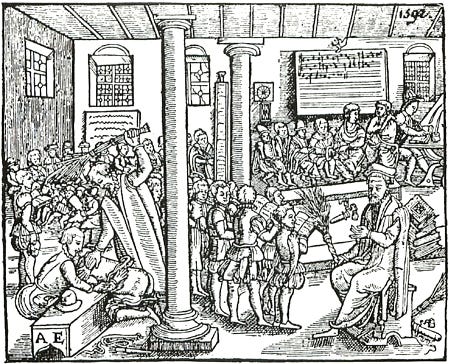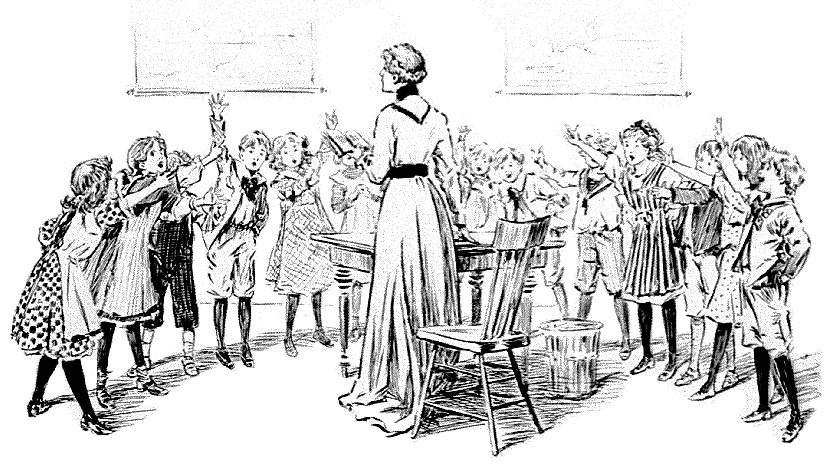Can the philistine supremacy be stopped?
Oppose the priests of ignorance!
News of the philistine supremacy keeps coming. It’s one of the most persistent stories of the moment. And it’s getting worse.
Along with teachers organisations in the US calling for schools to “de-center” books, teachers in the UK calling for Shakespeare to be removed from the curriculum, we now have Oxford University, of all places, removing the requirement for Classics undergraduates—the ones studying Latin and Greek—to read the whole of the Aeneid or Iliad. Instead, they will study selected extracts of the Odyssey.
And a UK government curriculum review is being told that taking school-children to the theatre and on museum trips is “middle-class” and “alienating”. Instead, they should tour football stadiums and take graffiti workshops. The professor of social mobility who proposes these changes, Lee Elliot Major, wants pupils to learn about figures like Michael Faraday and Mary Anning, and to remove middle-class bias from exam questions.
Those are smart ideas. Skiing references in exam questions are doubtless unneeded and potentially alienating. Of course children should know about Michael Faraday and Mary Anning. But all children should also go to the theatre and to museums. Knowledge is a route to social mobility.
When the actor Patrick Stewart was a boy he lived in a working class neighbourhood in Yorkshire. There were two rooms in his house—and four books. No hot water. No inside toilet. At school he discovered Shakespeare, introduced to it by two teachers. Word went round the community that he was interested in the plays and in acting. One day there was a knock at the door.
A neighbour had turned up with a Collected Works for the boy. It was of no use to them, they said, so he should take it. This began his road to acting with the Royal Shakespeare Company.
It is through this sort of exposure that people achieve “social mobility”. Imagine if Stewart’s teachers had told him that the theatre was middle-class and alienating and taken him to the football instead. What education and sociology professors rarely account for is the inherent quality of different activities.
We do not privilege the theatre for snobbish reasons. Museums are not mere class markers or signalling opportunities. We are talking about the best of human civilization. That doesn’t mean everyone has to like it. It doesn’t mean that the people who do like it are superior people. But it is a question of knowledge and ignorance, of seeing great work or not seeing it, rather than a question of preferring cultural activities for class reasons.
Why can’t professors like Lee Elliot Major advocate for more education rather than different education? Inevitably, the cry goes up, about resources, and the difficulties of managing with everything schools have to do. I don’t believe it.
We heard from a homeschool family this week whose child wanted to try school. It turned out to be an experiment in boredom. They spend an hour a day reciting times-tables. (The fact of teachers not knowing about the effectiveness of flashcards is a horrible irony.) For science lessons, they cut out animals and arrange them into vertebrate and invertebrate piles. History and geography are alternated termly. Art and music are once a month. The child is nine.
The school is rated Outstanding by Ofsted! That’s not a resources problem. Extra spending doesn’t change outcomes very much.
This is rather a fraught question, and you can find studies to confirm you in your existing opinions if that’s what you want. But what is fairly clear is that improving outcomes isn’t a simple question of increasing spending.
Scotland recently took a dive in school performance. Funding wasn’t cut: a progressive ideology was introduced. New Zealand’s schools started performing very badly several years ago, again, not for funding reasons. South Koreans were recently spending so much on eduction the returns vanished. Germany recently got poor PISA results, too. They spend as much as their neighbouring countries. Lots of people blame covid closures but it’s not so clear that can account for Germany. What Germany has chosen to do is to teach less. From the Economist,
…many parents actually shun pre-school education in the belief that it encourages competition. German children start school at six, but early schooling is often lax and playful, because children “should not be overstressed”. Fourth-graders, for instance, spend almost 30% less time reading in class than the OECD average. Teachers, in Germany traditionally unquestioned masters of their classrooms, often resist evidence-based new methods, or standardised tests that might “stigmatise” poor performers. Many see education not in terms of building core competences, but as a mission to create cultured citizens. In most German states primary school lasts just four years, at which point pupils are divided between those destined for academic studies or for technical/vocational careers.
It’s an ideological problem.
We don’t expect enough. Victorian children learned far more than the homeschool child I reported above is being taught at school. There was a time when the children of elite families at that age would have been expected to be able to arrange cut out shapes of the countries of Europe, let alone vertebrates. Grammar school pupils in the sixteenth century were expected to use Latin not just in the classroom, but during playtime. We have books and pencils and paper. What is needed is time spent at the work.
The British government has many aims for their education policy: more teachers, more teacher qualifications, report cards, and the like. None of this amounts to teaching children more. There is little political messaging to be had from fighting ignorance and dispensing knowledge. No funding is required. No arguments need to be had about regulations, qualifications, standards or anything else. The curriculum could be left alone. What is needed is a change of heart.
The problem is that far too many of the people in positions of influence are spreading a philistine ideology. They want children to know less. From Oxford’s lack of Latin to the proposed diminishment of the school curriculum to the New York Times critics writing that literary greatness is a mirage to elites who (claim to) prefer TV to books, we see the same thing.
Many people worried about the future of culture and education are worried about AI or technology. What worries me is the philistine supremacy that is taking hold of cultural and educational institutions.
We need to fight these priests of ignorance. Their mission is not so much to corrupt the youth as to leave them narrowed, unexposed, dulled.
Let’s hope it’s not too late. The longer this is tolerate, the more children will receive an inadequate education in the name of an ideology that isn’t dedicated to knowledge.
We can’t have philistines running schools.




Keep saying this. No one seems to be listening. When I taught English in the inner city, I was told by colleagues “these kids” couldn’t do Shakespeare. Not only did they read it, they performed it, and they had a blast doing it. Children rise or fall to meet the standards of the adults around them. Teaching down to them is not only doing them a disservice, but doing a disservice to society at large.
I couldn’t believe the idea about visits to football stadiums - as if football is in need of promotion, rather than sport already overpromoted as a route to social mobility for working class children.
How will that close the widening gap in the arts?
The mention of football, graffiti and rap also felt like it came from someone whose ideas of ‘yoof’ were formed working in inner city London in the 80s / early 90s. They are, broadly, boys interests.
And considering rap, one of the most successful hip-hop producers in Britain - 34 year old Inflo - has clearly had a musical education that has taught composition and arrangement and exposed him to classical music (June 55 by Sault being a pure instrumental where this is clear).
I’m not making a case that it’s great contemporary classical, but it is the result of believing that all children have a right to learn about orchestral music.
What’s also clear is that this will all only apply to working class children. The government will have no power to close down Eton’s school theatre, or ban theatres from admitting children on the grounds that middle class parents are privately giving their children a leg up by taking them to see ‘Matilda’.
It seems so self-evidently wrong headed that I can’t believe it’s got this far.
And I say this as someone ideologically opposed to Gove and Cummings, but reluctantly coming round to idea that their instinctive suspicion of a lot of educationalists was right